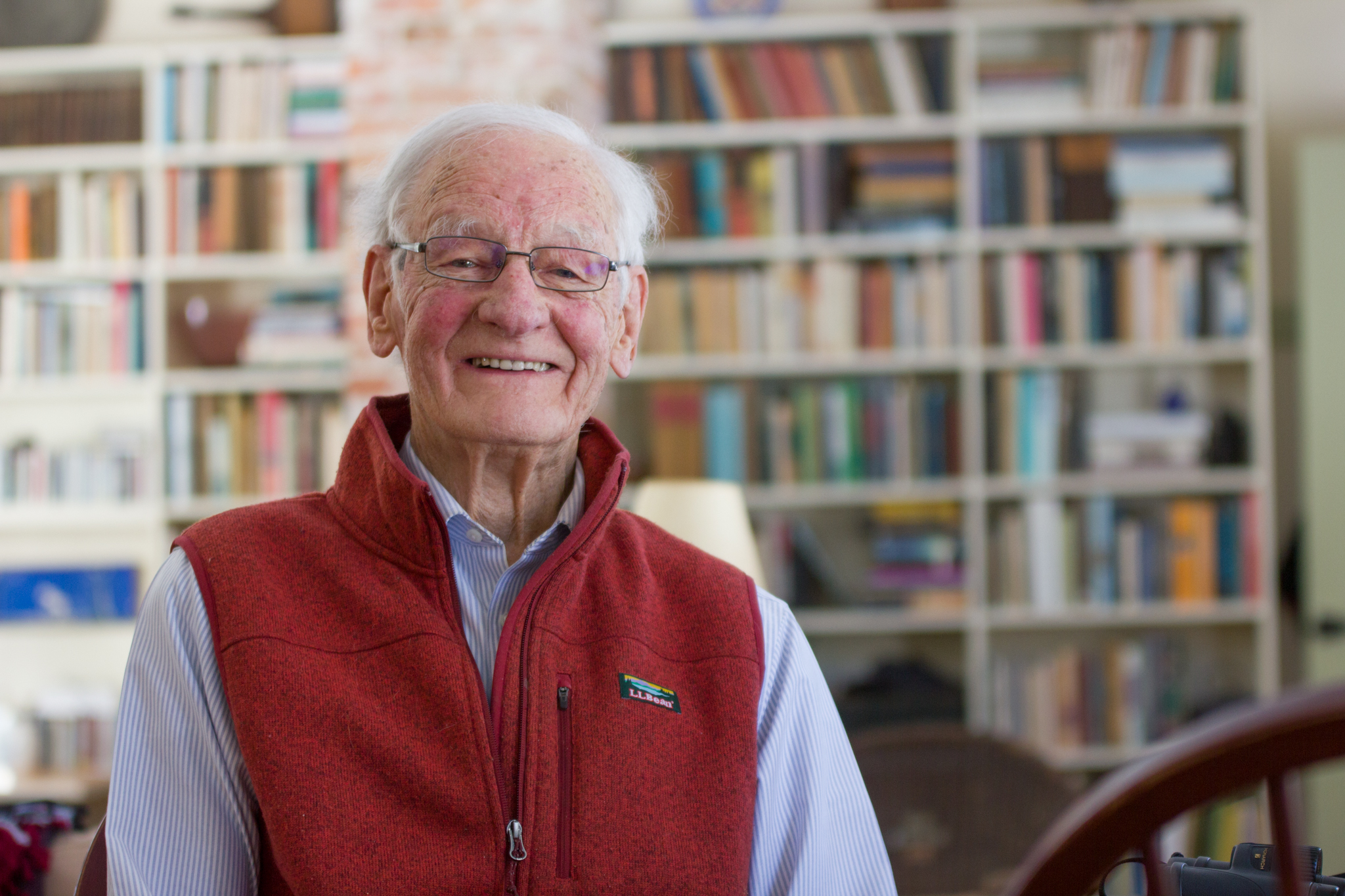Former Bowdoin professor and Green Party co-founder reflects on legacy
February 28, 2020
John Rensenbrink was working in the fields of his family’s farm in northern Minnesota when his mother told him that America had dropped atomic bombs on the Japanese cities of Hiroshima and Nagasaki. The year was 1945, and Rensenbrink was 17 years old.
“I felt that something had turned. Something so awesome and so unbelievably shattering: human beings unable to control their own love for destruction,” he recalled.
Now 91 years old, Rensenbrink has been an author, a farmer and a candidate for the U.S. Senate, but he is perhaps best known as the co-founder of both the Maine and the United States Green Party. His roots in Maine start at Bowdoin, where he spent most of his career as a professor of political philosophy. After briefly teaching at Williams College from 1957 to 1961, Rensenbrink headed north toward Brunswick and has lived in Maine ever since.
Today, sitting at a sturdy wooden table in his dining room near the town line of Topsham and Brunswick, Rensenbrink thinks about his granddaughter. A star on her high school basketball team, she is about the same age Rensenbrink was at that moment when the world changed forever. Rensenbrink wonders what the world might look like when she is 91 and what battles her generation will face in the meantime.
 Reuben Schafir
Reuben Schafir“I weep thinking about it … But I know we have to help other people by making them feel the presence of love. We live in a depressing time, and it is [easy] for people to quit. But as FDR would often respond to those immense problems: when you run out of rope, tie a knot, and hang on.”
Rensenbrink ran for U.S. Senate in Maine in 1996, coming in third behind Maine’s current senator, Susan Collins, who was then a relative newcomer to Maine politics. He was a candidate for the Maine Green Party, a party he founded in the late 1980s after Jesse Jackson was excluded from the 1984 Maine caucus by the Maine Democratic Party. It was the first Green Party in the United States and paved the way for the founding of a national Green Party a few years later.
In the next two decades, the Green Party’s political capital grew, and Rensenbrink was suddenly advising Ralph Nader’s campaign for president and the party was receiving millions of votes. But Rensenbrink’s goal has never been to tear down the whole system.
“I didn’t even realize that I was somebody on the left. I was just a lanky farm boy from Minnesota who was drinking it all in and realizing a lot of hypocrisy, a lot of people not living up to what they said they were for,” Rensenbrink said. “I felt gradually over the years, the goals and ideals of the founding fathers and the republic were betrayed again and again. And I still think that’s true. You’ve got a [political system] that gets worse and worse.”
Rensenbrink was outspoken about political issues throughout his academic career. When teaching at Williams, he was denied tenure because of his political leanings. When he inquired further about why he was not welcome back, the president of the college told him it was because he “wouldn’t run in harness.”
After Williams, Rensenbrink brought his radical ideas with him to Bowdoin. He remembers fondly the series of student and faculty strikes at Bowdoin in protest of the Vietnam War and said that while Bowdoin has never had the most radical student body, he was always able to find students that were energized and demanding of change.
“During the ’60s and ’70s the student body broke down into three different segments: those who were solidly with the establishment, those who were anti-establishment and were more progressive and then the many in between,” he said. “And so the third that was really hooked on progressive ideas and values and [were] committed to shaking things up. They liked me.”
In the 20 years since he left the College, Rensenbrink has noticed that Bowdoin students seem to be less engaged with the politics of their time. While encouraged by the post-Trump increase in student activism, Rensenbrink implores current Bowdoin students to heed the lessons of history, especially as the lines between right and wrong grow clearer every day.
“Where do you stand? You should ask every Bowdoin professor [and] every Bowdoin student that question. Because it’s getting clearer and clearer as to what the basic dichotomy is,” he said. “That [question] is something that is missing from the campus, and is a question we should also be asking President [Clayton Rose].”
Still a member of the Maine Green Party today, Rensenbrink acknowledges the limits of third-party electoral politics but remains committed to the causes he has fought for his entire life. He is more convinced than ever before that justice and kindness will ultimately prevail.
“There are rebellions going on all around us, and when you begin to glean how the American people are rejecting the neoliberal establishment and rejecting Trump, then there is a completely different picture before your eyes.”

Comments
Before submitting a comment, please review our comment policy. Some key points from the policy: